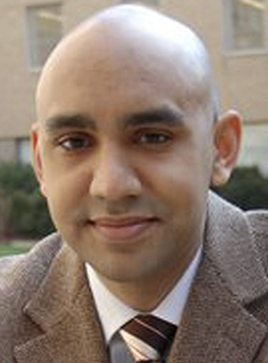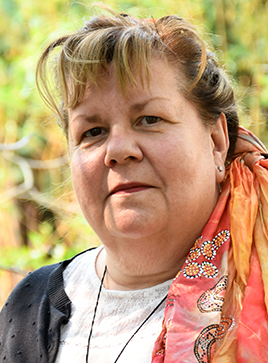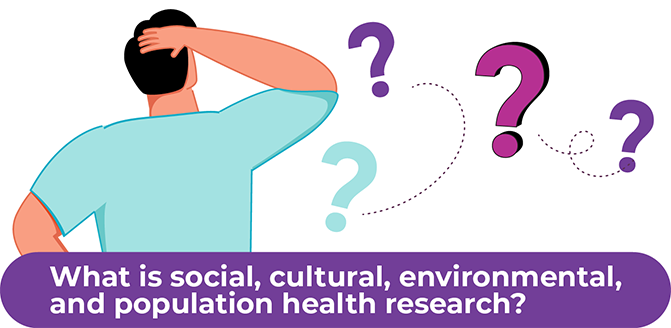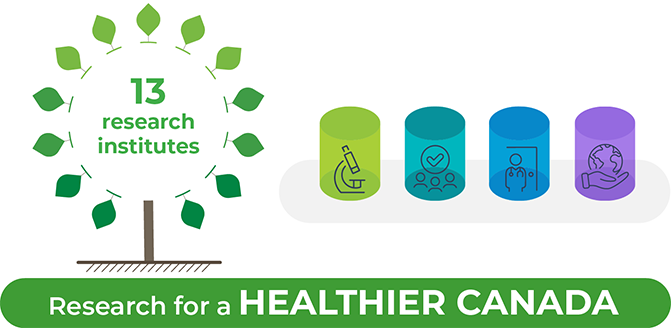Social, cultural, environmental and population health research (Pillar 4)
We are often taught that ‘health’ is an individual responsibility—that it’s up to each of us to eat properly, stay active, and generally make healthy life choices. And while that is true to a certain extent, the reality isn’t quite so simple.
There are many factors that shape your health and wellbeing, including ones that may not even be in your control. Did you know that your postal code is said to be a better predictor of your health than your genetic code? Studies have shown that where you live can actually influence your risk for cardiovascular disease, diabetes, and cancer.
How is that possible? Well, let’s examine how one of those ‘individual’ responsibilities can be affected by other forces.
If you are striving to be more physically active, for example, is your environment helping or hindering you? To answer this question, consider the following:
- Does your city or town have bicycle lanes, walking paths, or bike-sharing programs that allow residents to safely get where they need to go?
- Is your neighbourhood designed in a way that supports people with different abilities to get around with ease?
- Are there parks or green spaces nearby where community members can play sports or otherwise be active?
- Does the air quality and climate allow for outdoor exercise?
There are social and economic factors to think about here, as well. Consider the following:
- Does your community have affordable and accessible sports facilities or offer free activities that encourage physical activity for all age groups?
- Are green spaces throughout the city equally maintained and cared for (across wealthy and not-so-wealthy neighbourhoods) so that all residents can enjoy them?
- Do you have the financial means to access appropriate exercise or fitness equipment?
- Do you have the time and support you need to exercise in between work, family and other commitments?
As you can see, there is much more to being physically active than meets the eye, and this is the case for many other aspects of health, as well. That’s why it’s so important to identify when, where, and why healthy options are not available to everyone equally—and figure out what can be done about it at the social, political, and economic levels. Doing so is necessary for helping individuals achieve better health, but the impact can also be felt across entire communities and populations.
The stark truth is that health inequities exist across Canada and can have a particularly pronounced effect on certain populations, including people with lower socioeconomic status, Indigenous peoples, sexual and racial/ethnic minorities, immigrants, and people living with functional limitations (such as physical or mental impairments). These inequities are often linked to structural forces such as racism, colonialism, ableism, discrimination, gaps in access to proper housing and health care, societal pressures and expectations, and inequitable health policies. All of this can affect what opportunities are available to people (such as education and employment), including access to resources (such as quality food, transportation, and housing), and the results can have a lasting impact on health.
Addressing these underlying issues requires a collective effort across all sectors and levels of government. We need to better understand how policies, programs, services, and infrastructure affect health and health equity. We need to identify when and where to make public health investments to maximize impact, prevent disease and injury, and promote good health. And we need the right tools to create healthy and sustainable living conditions and environments for communities across Canada and around the world. Ultimately, we need to strive to achieve a society where social factors such as postal codes are no longer significant predictors of health and life expectancy.
This is where social, cultural, environmental and population health research comes in.
What does social, cultural, environmental and population health research do?
This research addresses challenges relating to many factors that can affect the health of a community or a larger population, such as:
- How can we design and build cities so that they improve health for everyone?
- Where, when, and why are people experiencing poorer mental or physical health? Are there trends for certain groups?
- How is climate change affecting health? Who is most negatively impacted, and what can be done about it?
- Are our health and social policies truly helping those who need it? If not, where are the gaps and what support is required?
- How can we improve overall trust in public health and science?
- What roles should different sectors and levels of government play to respond to public health emergencies? And what approaches work best for different types of public health issues and threats (such as infectious disease outbreaks, the opioid crisis, food insecurity, racism, and environmental disasters)?
Faced with such complex questions, these types of research projects aim to understand how the different pieces of the puzzle interact to influence our health. Studies may involve conducting focus groups, evaluating the impacts of local, national and international policies, analyzing health data and trends, or designing and testing health programs and interventions. These activities produce the data and evidence we need to design and implement solutions that will help improve the health of communities and populations everywhere.
This work is typically a multidisciplinary and multi-sector endeavour, so researchers from a variety of fields work with a wide range of experts, including health care providers, epidemiologists, community organizations, governments, policy makers, and citizens.
Show me the research!
Browse the stories below to learn more about real-life social, cultural, environmental and population health research taking place across the country.

Dr. Arijit Nandi
McGill University

Dr. Daniel Fuller
University of Saskatchewan
A perfect pair: Why health research and urban planning go hand in hand

Dr. Elizabeth Saewyc
University of British Columbia
Celebrating diversity and fostering inclusion to improve the health of LGBTQ2S youth

Dr. John Oliffe
University of British Columbia
Reframing masculinity: Connecting men to mental health supports that work

Dr. Sherilee Harper
University of Alberta
Weathering the storm: Exploring climate change as a health issue

Dr. Alexandra King
University of Saskatchewan
Bringing Indigenous health into the light: Supporting Indigenous women’s wholistic healing journey
Features
- Date modified:



